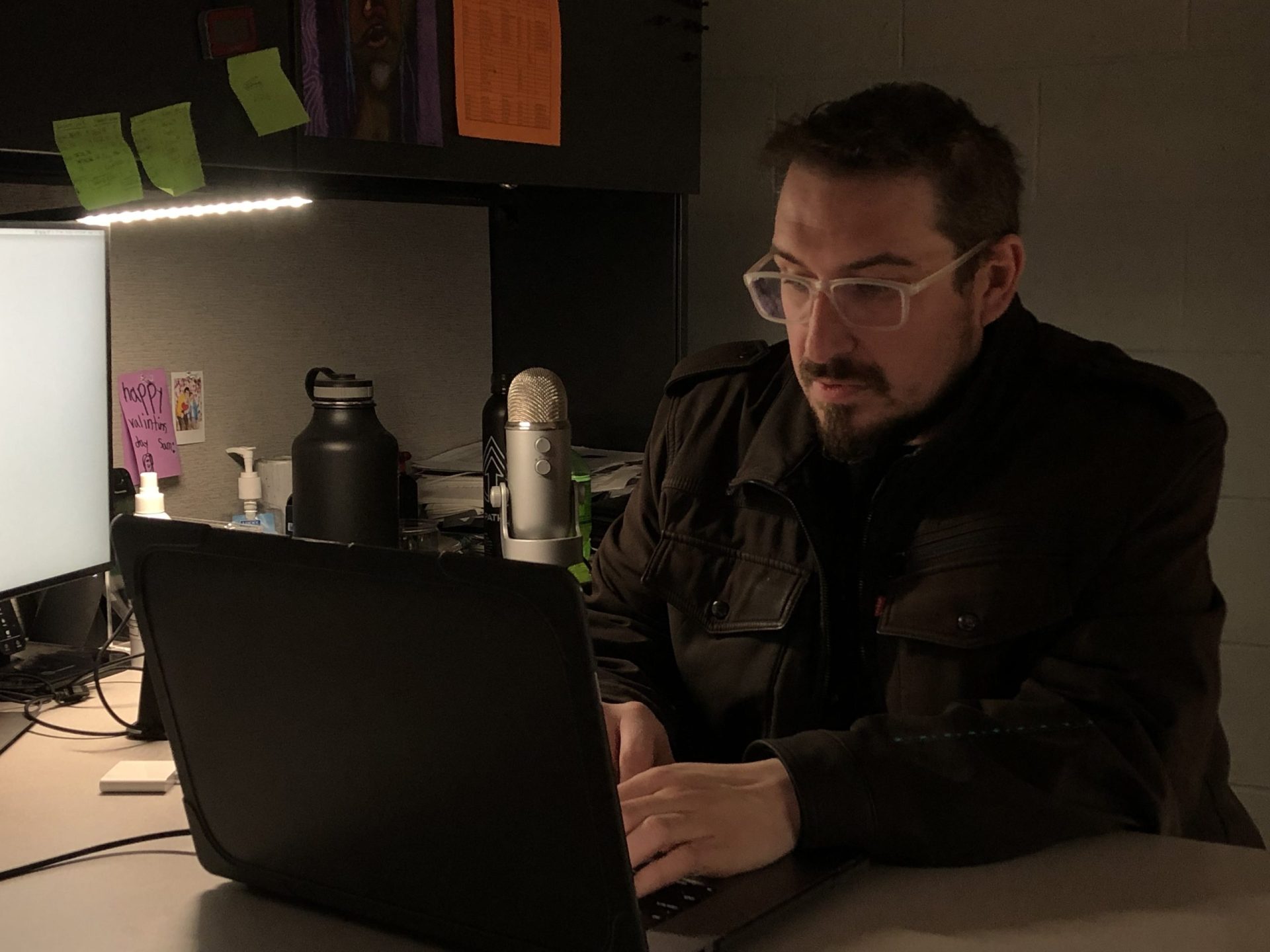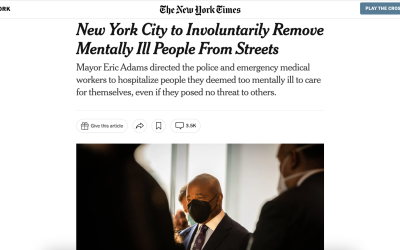In part two of my interview with Sam Rapien, professor of visual communication and design at UNK, Sam talks about his own undergraduate experience and how it shaped his teaching practices.
You have this mentality about self-care. Have you had any similar mentalities or philosophies over your years of teaching?
I have a lot of philosophies. I have opinions on just about everything at this point.
When it comes to my profession, I accidentally fell into teaching. It was not something that was on my radar at all. It wasn’t until I had to teach in grad school as part of my free tuition that I had to teach.
On top of that, I really discovered this is amazing; to collaborate and work with students. I then saw my role not as this authoritarian like, “hey I have all the answers. I’m the gatekeeper to the information. Do what I say”. You know that kind of thing. Instead, I’ve always seen myself as someone who has a certain skill set who knows some things, who’s taken time and dedicated to study these things. A student is someone who’s paying to get that information so that I can get them further than I was when I was their age.
A lot of my teaching philosophy kind of centers around the idea that I want to give to students what I wish I would have had when I was a student. To treat students as people. I know it’s silly, but this is my 16th year of teaching now, and being around other instructors, there’s plenty that have this same mentality, but there’s a lot that don’t. It’s very much like, “they’re the student. I’m the teacher”. That kind of carryover dynamic, I never liked when I was a student.
The way that I learned how to teach was doing the opposite of what those instructors did. Trying to make personal connections with the students because they’re all individuals. Everyone has their own motivations and goals and skill sets. I always just wanted to be the instructor who was humble enough to say, “I don’t know, but I’ll find out”. The one who’s approachable and human enough to be able to treat you the same way I would a colleague or a friend, or an acquaintance.
I don’t see this power dynamic that I think a lot of others see. And part of that was because I never had a whole lot of respect for those teachers, and there were far more of them than there were the more approachable.
I wanted to be just Sam, I’m just Sam. “I know some stuff, let me impart it on you if you’re interested in learning it, and we’ll go from there”.
How has your undergrad experience shaped your teaching?
My undergrad experience was kind of awful. Not awful in the sense that it was atypical. It was very typical.
I went to the Savannah College of Art and Design for a year. That was the school that I wanted to go to from the 6th grade and so everything from middle school into high school was my focus and my target.
When I got there, what I realized pretty quickly is that colleges are businesses, and a private college is very much a business. I didn’t feel I was getting a very well-rounded education. It was all art based and I had interests in psychology, sociology, and English and I wasn’t really getting much of that.
I came back to Nebraska and went to UNL. Then I began to see a bit of a flip side to things where I wasn’t even getting the art education that I felt like I needed to be getting.
The way I began to look at college as an undergrad was, “OK. Well, what I’ve really done is I bought myself time to study”. Even though there were things that I knew I wasn’t getting in my design education, I was then buying textbooks and I was reading up. I had this mindset of, “I need to take these four years and learn as much as I can on my own”.
That very much informed my current philosophy because I want to try as much as possible to give students their money’s worth, and then some if possible. But because you’re paying for this and it shouldn’t be something where you have to do it and learn it on your own. I think that’s a big one for me.
I had a couple of professors who were not only not very good at teaching. I think they were knowledgeable, I think they were talented, but they couldn’t impart that knowledge and that was also pretty quickly when I learned that, “oh, professors don’t have to learn how to teach. They’re really just experts in their field”. They do what they want a lot of the time. They don’t take any training on how to teach. Learning from them too, taking from them and being, “well I don’t want to do that. I want to be able to take what I know and find ways to impart it on the students”.
There were times too, I had professors who seemed more interested in their own work and research than what their students were doing or producing in their classes. That’s the whole reason I’m teaching is to get students to where I know they can be and to push them further than where I was when I was the same age.
I would say those experiences where it felt like I was on my own or that I had professors that didn’t quite care was when I finally got into a position of teaching myself and, “I want to be the instructor that does the opposite of those things”.
I learned from the worst is what I tell people. I learned from the worst what not to do, I’ll just do the opposite of that.
Have your philosophies or mentalities influenced your work or your art over the last two years?
A little bit. You know, especially the self-care and taking time for myself has done a better job of giving me space to think about my work and a lot of my work is social, political, you know? Kind of confrontational at times, but I think without taking that time and building that space for myself would be hard to just even conceptualize what I want to do next.
I would say that a lot of these things have done more to inform my teaching and the way that I’m approaching education, or even the way that I’m thinking about education.
Talking to students and hearing their struggles and their interests and what they want to get out of college and then really trying to take those things and talk to my colleagues about that and try to change certain things within the departments to align a bit better with what students are asking for.
I think my philosophies have definitely informed that more, and even classroom policies and things like that, I always grimaced a bit at. Attendance policies at colleges, again to me it’s kind of a holdover from high school, but where you’re paying for it, it’s “well, if you decide you don’t want to show up, then that’s on you” it’ll probably affect your work and will probably affect your grade. Ultimately I’m not going to penalize you for something that has nothing to do with your proficiency.
Especially after COVID, a lot of it was, “no please stay home if you got the sniffles or whatever”. I will accommodate, I’ll record my lectures. You can zoom in. I think that there’s been a great reflection that’s happened after the pandemic and afterwards too. We’re looking at some of these things and going, “some of this is silly. It’s either antiquated or it never really made sense”, and I’m hoping that continues instead of just going back to the ways that we’ve done things.
I don’t know if you feel this way, but I feel like we’re just going back to the way that we’ve done things. That’s a bit disappointing for me.
I would agree. It felt, at least for me, it was more accommodating and everyone was working together to mutually produce good work and good classroom practices, and now we’ve gone back to the rigid attendance policy and things that were outdated.
It’s weird too because this goes along the lines of what we’re talking about. I felt as an undergrad that I didn’t have a whole lot of power. It was very much, “I’m just one of many students and then I sit and shut up and listen to the teacher and do what they tell me to do and everything is gonna be fine”.
I would say, especially going into higher education, one of the things that I really try to impart on students is you have a lot more power than you think you do. I feel like the way that the system is structured and set up is almost intentionally to make you feel like you don’t, or that it’s this continuation. Without students this place doesn’t exist, it doesn’t run.
In conversations that I have with students all the time, they also know that some of this stuff is silly, it’s antiquated, and it has nothing to do with learning. It’s more about compliance and even though they know that, it’s this, “but what are you gonna do? You gotta do what the teacher says, you gotta follow the syllabus”.
Maybe it’s the rebellious side of me, but there’s a part of me that says, “no speak up, say something. I know it’s silly, I know that there’s other instructors that think it’s silly too”, and generally when more noise is made people actually start listening. But a lot of times it’s, “yeah no, we’ll just keep doing what we’ve been doing”.
This interview has been edited for length and clarity.




0 Comments